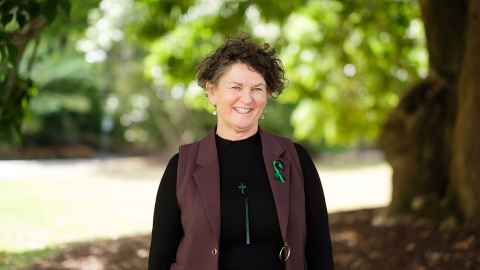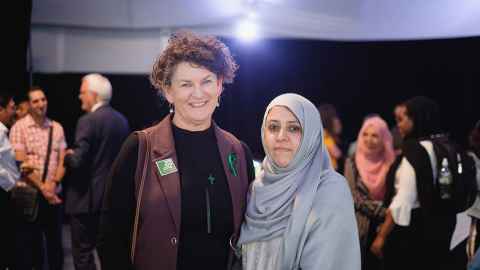On a wing and a hopeful prayer
31 March 2020
Reverend Dr Carolyn Kelly has been the University of Auckland chaplain for four years. She reflects on a job well done as she prepares to move to the other side of the world in yet another challenging time.

On 13 March, Reverend Dr Carolyn Kelly was part of the congregation at an event held in the University Pavilion to remember the horrific events of 15 March, 2019.
It was an emotional event for two reasons. The cause of the remembrance itself, and the fact it was held on Carolyn’s last day working at the University. She says while the Christchurch terror attack was the worst of times in New Zealand, the response to it was positive and uplifting.
“The hope and the community support we demonstrated and the care for one another was powerful,” she says. “It’s really important that we do keep honouring it and keep thinking about our relationship with the Muslim community. If ‘they are us’ as we said they were, what does it mean in the way we live?”
She says the time was challenging for everyone.
“We were really stretched at the University but thankfully we already had a voluntary Muslim chaplain, Shahela Qureshi, on our team. She was actually overseas on sabbatical at the time but she pitched in and was advising us … it was a really hard time for her too.”
She says having a chaplain for Muslims is very much in keeping with the move towards multi-faith chaplaincies around the world.

AFFINITY WITH SCOTLAND
Covid-19 travel obstacles aside, Carolyn is due to start a new job as the chaplain at Glasgow University after seven years at the University of Auckland chaplaincy, the past four full-time as the Maclaurin Chaplain.
“I have a real affinity with Scotland,” explains Carolyn. “We’re Presbyterian so we have that link to the Church of Scotland, and our family lived in Aberdeen for nearly six years where I studied. I just finished my PhD and we came straight back to New Zealand. When I left Scotland I didn’t realise I’d head into University chaplaincy but I did and it’s been wonderful. But there’s been a sense of our time not being over in Scotland, and one of our daughters lives there.
“When we were on a sabbatical 18 months ago, it felt like we weren’t done there.”
Whoever takes Carolyn’s place as University Chaplain will need to understand the changing nature of university community faith practices. Although the Chapel and the lead chaplain’s position is for a Christian minister funded by the Richard Maclaurin Goodfellow Trust, it’s very common in overseas universities to have other chaplaincies.
“That’s a journey that, as a community, we undertake together and it’s not just down to me as a chaplain just to say, seriously you need to do this. Let’s walk in partnership and see how this will evolve and reflect our character, in keeping with our University’s vision and our values.
“We also have to honour our existing traditions – this beautiful chapel was gifted by a Christian trust but has become a place that’s hospitable and that’s reflected in the chaplaincy.”
She says the University has to work with other faiths, such as Muslim, to create a model that works here.
“In Britain, many universities have integrated their multi-faith chaplaincies very well into student life and that’s the situation I’m going to at Glasgow.”
Engaging with our community is the key to enabling our young students’ thoughtfulness. That means not throwing out the traditional but being able to reimagine in today’s times.
SHAKE-UPS ARE USEFUL
Carolyn says she’s had a wonderful time at Auckland, with many highs.
“One was when the Board agreed that I could build a team, about four years ago. In previous times our chaplaincy was one chaplain paid for by the Board, and there might be one or two others supported part-time by someone else. That was a huge turning point because it meant I could bring in a couple of part-time chaplains with different skills to reflect our community and become more effective.
“The other success has been the partnerships with New Zealand Christians in Science. That’s helped us to have academically focused events, and to consider how we integrate faith with the biggest issues of science and ethics. We’ve had panels on such things as climate change, and how we respond to the End-of-Life Bill. So we have conversations with Catholic, with Muslim, with ourselves and others, and it’s been really positive.”
In a largely secular society though, could religion do with a bit of a shake-up?
“Numbers in traditional churches are in decline. So that’s a challenge. But for me, engaging with our community is the key to enabling our young students’ thoughtfulness. That means not throwing out the traditional but being able to reimagine in today’s times. Guy Consolmagno, the Vatican astronomer, is doing exactly that. They’re incorporating and researching the frontiers of science, yet recognising that at times the church has struggled with science, so shake-ups have happened at different moments. Churches needed to find fresh ways of being in this world in a way that’s authentic but also incorporates the gospel.”
She says Christianity, and all religions, must acknowledge history, good and bad.
“Abuse in the church, colonialism, our early interaction with Māori, we need to talk about those things. They don’t completely define our Christian history but they’re part of it. If we believe in God, and a God of grace, we shouldn’t be fazed by these discussions. We should welcome them.”
Carolyn is looking forward to immersing herself in the history of Christianity through Glasgow University, one of the oldest English-speaking universities in the world.
“I love Scottish history and the history of Christianity, so there’s a deep pool I’d like to swim in. Glasgow University was established in 1451, and the history of St Kentigern or Mungo the patron saint of Glasgow, is so interesting. What does it mean for this ancient land, with valued Christian traditions in this incredibly complex time, to find new ways of living our faith?”
Carolyn’s husband will be alongside her, when church services resume following lockdowns around the world.
“My husband was a Church of Scotland minister in the past so he’s going to be teaching and training people in the Church of Scotland through a University post as well. He’ll be part of my flock!”
As well as the impact Carolyn has had on the University, she will be leaving something of herself behind. In days gone by there was an artwork Carolyn loved, by Don Binney, that hung in the chapel. It disappeared and she found that it had ultimately ended up in the University’s Science Block.
“It never came back to us. But I was talking to the University art collection people who told me about another one, and asked me if I’d be interested.”
That Binney artwork Kawaupaku te Henga (1967) features a small black shag flying over the lake at Te Henga.
“Now it will hang in the chapel and it’s lovely. It reminds me how we learn from birds and from the natural world,” says Carolyn.
“Birds are also a theological symbol suggestive of the Trinity. In scriptures, the bird often signals the presence of the Spirit in the world. It reminds me that God is watching over this place. I feel like it’s sending me off. I feel like my time here is done.”
Now all that’s left is to have faith that her own flight isn’t delayed for too long.
This article appeared in the April 2020 UniNews magazine.
To contact UniNews, email us.